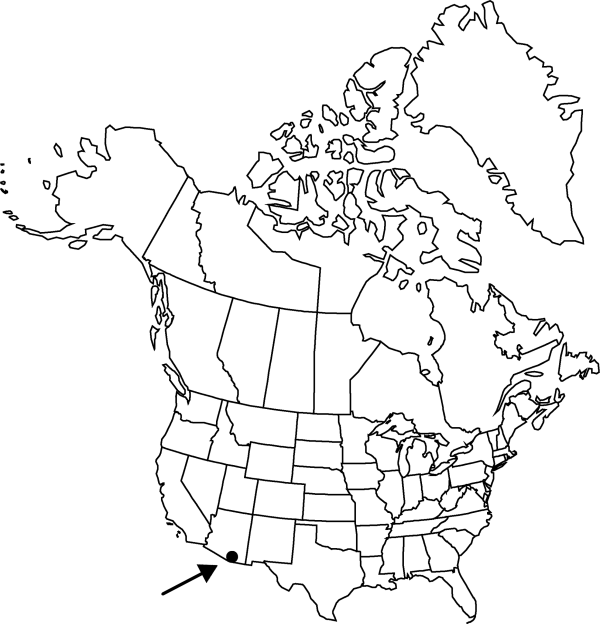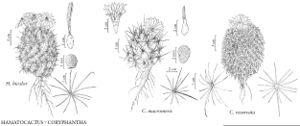Coryphantha recurvata
Cact. 4: 27. 1923.
Plants unbranched or few branched, except in old age, ultimately forming mounds, rarely to 1 m diam., stems to 50, with most spines pressed against stem outline. Roots ± diffuse. Stems spheric to broadly short cylindric, 10–25 (–30) × (7.5–) 10–15 cm; tubercles 6–10 × 6 mm, firm; areolar glands seasonally conspicuous; pith 1/5 of lesser stem diam.; medullary vascular system conspicuous. Spines 12–20 per areole, tan or yellow, largest spines turning gray with red tips, all nearly terete; radial spines (12–) 15–20 per areole, 12–15 mm, basally 0.5 mm diam.; central spines 1 (–2) per areole, decurved, (15–) 20 mm, usually less than 1 mm diam. Flowers distant from stem apex, forming ring around distal portion of stem, 25–40 × 25–40 mm; outer tepals denticulate; inner tepals 20–30 per flower, greenish yellow or lemon yellow, 18 × 3–4.5 mm; anthers pale-yellow; stigma lobes ca. 5, pale green (requiring verification), ca. 2.5–2.8 mm. Fruits greenish white (drying yellow-green) to partly or wholly tinted with dull reddish-brown, usually 1.5–2 times longer than thick, spheric or elongate, 9–12 (–13) × (4–) 5–7 mm, pulp sparse and soon drying; floral remnant strongly persistent. Seeds bright brown, spheric, finely and weakly raised-reticulate.
Phenology: Flowering summer; fruiting winter (Nov–Jan).
Habitat: Valleys, mesas, foothills, grasslands, oak belts, grassy or rocky areas
Elevation: 1200-1800 m
Distribution

Ariz., Mexico (Sonora)
Discussion
Selected References
None.
